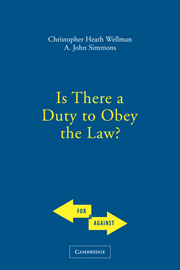7 - Natural Duties and the Duty to Obey the Law
Published online by Cambridge University Press: 05 June 2012
Summary
The Basic Argument
The failure of Transactional and Associative theories to explain the source of a general duty to obey domestic law pushes us to explore other possibilities. In particular, since the moral duty to obey seems to many a relatively basic, natural, nonvoluntary feature of social life, it seems initially promising to suppose that the moral principle that accounts for this duty belongs to that group of principles that specifies our natural moral duties. Natural Duty theories of the duty to obey the law, as we have seen, are those that ground our duty to obey not in who we are (as in Associative accounts) or in what we've done or enjoyed (as in Transactional accounts), but rather either (a) in the moral importance of advancing some impartial moral good or (b) in some moral duty thought to be owed by all persons to all others as moral equals, regardless of roles, relationships, or transactions. Thus, the natural duty in question, from which the duty to obey is to be derived, could be a consequentialist moral duty to promote or maximize the occurrence of some good property or state of affairs – such as happiness (utility, preference satisfaction, etc.), moral perfection, or justice.
- Type
- Chapter
- Information
- Is There a Duty to Obey the Law? , pp. 121 - 188Publisher: Cambridge University PressPrint publication year: 2005
- 2
- Cited by



